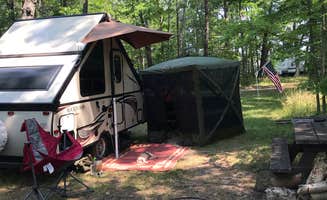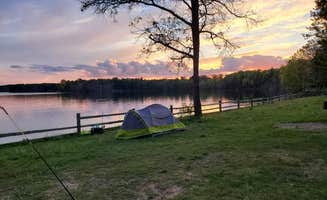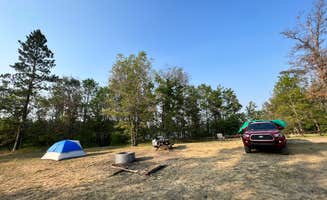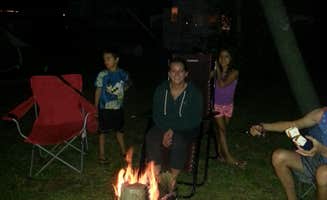Camping sites near Lewiston, Michigan offer rustic experiences across several state forest campgrounds situated in Michigan's northern lower peninsula. The terrain features sandy loam soil with predominantly pine and oak tree cover, creating filtered shade throughout most sites. Summer temperatures typically range 70-85°F during day and 50-60°F at night, with higher humidity in July and August.
What to do
Fishing opportunities: Shupac Lake State Forest Campground provides access to a spring-fed lake with clear waters. "There's 30+ spacious campsites all lake side! Beach is clean and Sandy! And has tons of places to hike and explore," notes a camper. The lake supports bass and panfish populations.
ORV trail access: Muskrat Lake State Forest Campground connects directly to regional ORV trails. "This rustic campground is right on the ORV route. This means you can camp here and even ride in your Jeep or side by side right from camp," explains one visitor. Trail maps are available at the campground entrance.
Kayaking and canoeing: Several small lakes within 15 miles of Lewiston offer paddling opportunities with minimal motorboat traffic. "The lake is very peaceful and quiet. Great for kayaking or canoeing! There are no houses on the small lake and it is typically calm water," notes a Muskrat Lake camper.
What campers like
Spacious sites: Avery Lake State Forest Campground receives consistent praise for site size. "This place was really nice and not very busy. It's on a beautiful lake that is great for swimming and boating. It has a few walk in sites that have beach access," reports one camper. Sites accommodate tents and smaller RVs with room for vehicle parking.
Lower crowds: Little Wolf Lake State Forest Campground typically remains less crowded than other area campgrounds. "Empty & Amazing... We were basically the only ones there other than a family all the way at the end. We had a giant site that had lake view and very clear access," writes one visitor. Most weekdays offer good site availability without reservations.
Wildlife viewing: Dawn and dusk provide optimal wildlife viewing opportunities around area lakes. "The morning on the water was amazing. Steamy sunlight kissed the morning while the loons sang their beautiful song," describes one camper at Little Wolf Lake. Common sightings include loons, deer, and various waterfowl.
What you should know
Variable cell coverage: Service varies widely based on exact location and provider. "I had 3 bars of service here," notes an Avery Lake camper, though coverage decreases in more remote sections of the forest.
Water availability: All state forest campgrounds in the region provide water via hand pumps. Water is potable but may have mineral taste. No direct hookups available at rustic campgrounds.
Site leveling considerations: Many sites have natural slopes. "Sites are good size. Reservation side has sites up to split rail fence. Ramps to walk down to water," notes a Big Bear Lake State Forest Campground visitor. Bringing leveling blocks for RVs and campers is recommended.
Tips for camping with families
Beach access options: Look for campgrounds with designated swimming areas. "The lake was absolutely beautiful and super blue and clear. The beach at the state park was nice but not really a natural beach but the lake itself is naturally sandy," reports a visitor to Clear Lake State Park Campground.
Bike-friendly campgrounds: Some locations offer better biking terrain for children. "Nice paved path through the campground, great for kids riding bikes around camp. They also have a playground with a cool old fashion slide," notes a camper at Otsego Lake State Park.
Kid-friendly activities: Bring water toys and beach equipment during summer months. "Great bike riding park for little ones," mentions an Otsego Lake visitor. Several lakes feature gradual entry points suitable for younger swimmers.
Tips from RVers
Size limitations: Most state forest campgrounds accommodate smaller RVs but have limitations. "Rustic and quiet. Lake is cute and ORV trails were great," notes a Muskrat Lake camper. RVs under 30 feet typically fit best at most area campgrounds.
Campsite drainage: Be aware of site drainage after rain. "During the downside is the sites are all sand. This is a problem when it rains. No matter how hard you try to clean your shoes, you end up tracking in wet, dirty sand," shares an Otsego Lake State Park Campground visitor. Choose elevated sites when possible.
Hookup availability: Limited full-hookup sites exist in the region. "The sites have been enlarged with plenty of space per site. Most of the sites overlook the lake," notes another Otsego Lake visitor. Make reservations 3-6 months in advance for electric sites during peak summer months.













